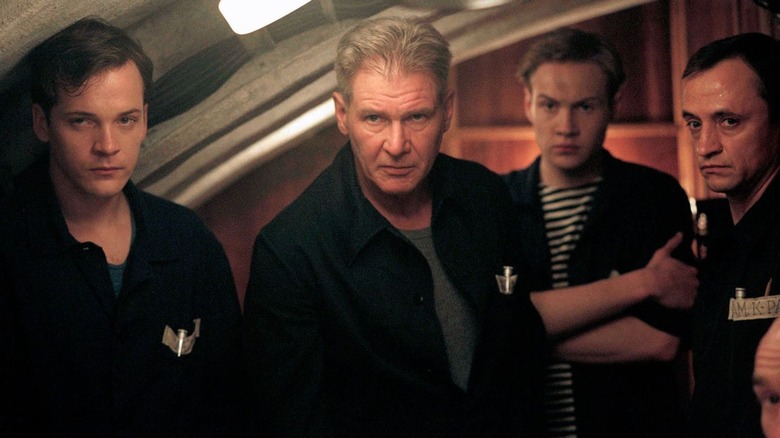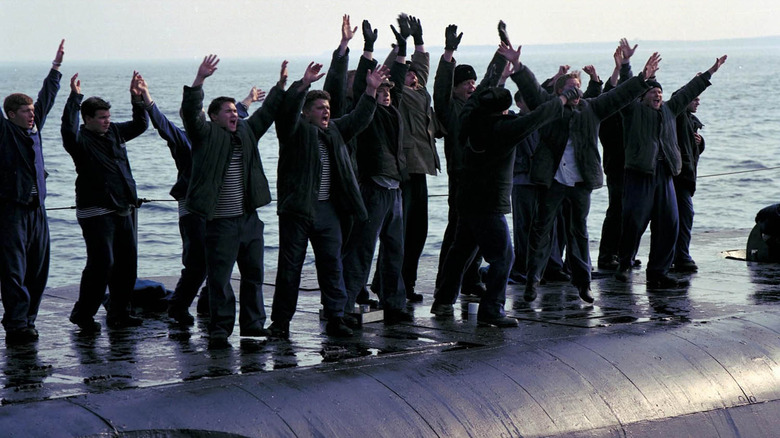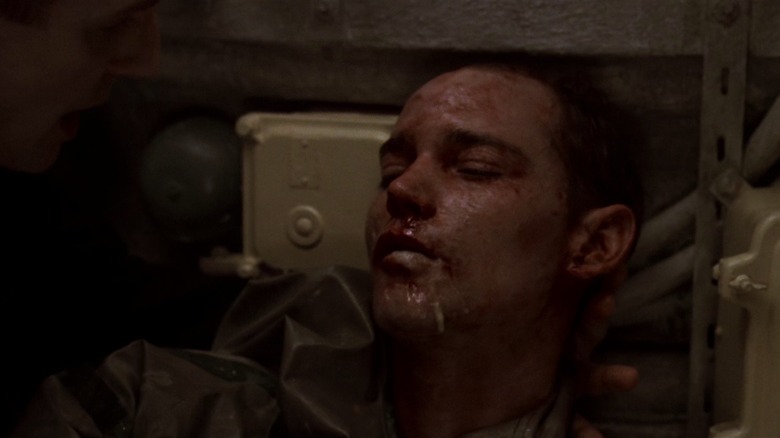Why The Real Survivors Of K-19: The Widowmaker Weren't Fans Of The Script
When you see the phrase "based on a true story" attached to a Hollywood movie, you should always take it with a grain of salt. But in the case of Kathryn Bigelow's 2002 film "K-19: The Widowmaker," there might not be enough salt in the ocean — at least according to the people that survived the real-life ordeal depicted in the movie.
The film is based on Russia's first nuclear-equipped submarine, the K-19, and the near-meltdown in the ship's reactor in 1961. What survivors didn't know is that, years later, they'd have another fight on their hands: A battle to have their story accurately told.
Although the brave actions of the submarine crew prevented a global catastrophe, a sneak peek at the script revealed that another story was being told. The men who fought to save the submarine and prevent a nuclear disaster claimed the early version of the "K-19: The Widowmaker" script was inaccurate, and went as far as to threaten a lawsuit if it wasn't changed.
Harrison Ford met with survivors
The film presents the moral question of what, if anything, should be off-limits to Hollywood. In 1994, the L.A. Times attempted to tell the horrific story, giving agonizing details of the accident aboard the Russian submarine that nearly caused a meltdown at sea and explaining how 22 volunteers died staving off a nuclear disaster. But some thought this tragedy was specific to Russia and its people, and were skeptical of the story being told by outsiders.
So you can imagine the reaction when Harrison Ford arrived in Russia, Hollywood script in hand, asking the survivors what they thought. According to CNN, not only was the script inaccurate, but it was also insulting. Survivors decried the portrayal of a broken-down ship, drunken shipmates, and a fictionalized conflict among the ship's officers in command.
Captain Igor Kurdin, head of the St. Petersburg Sailors and Submariners Club, said, "This film isn't about Russians, but about how Americans want to see Russians." He found the timing of "K-19: The Widowmaker" curious, accusing Hollywood of taking advantage of the Kursk submarine tragedy in 2000, in which 118 crew members were killed in a Russian naval training exercise. Kurdin told The Guardian:
"We suspect that the film's idea is to show that Russian submariners were incompetent 40 years ago, and to imply that this is how they are now, in the wake of the Kursk tragedy."
While the Kursk tragedy might have piqued Hollywood's interest in the story, the screenwriters cannot bear all the blame for not knowing the whole story. Hollywood writers may have turned to Russian stereotypes because it was difficult for anyone to know the real truth about the accident.
The Soviet government hid the truth
As the L.A. Times points out, until the breakup of the Soviet Union in 1991, very little was known about the K-19 incident. It was commonplace for the Soviet government to cover up any type of embarrassing event such as K-19; just look at Chernobyl as a primary example of this mentality. The same tactics were used to cover up the K-19 accident. Six of the volunteers that prevented a meltdown were killed by such dangerous doses of radiation that their corpses were buried in secret, and the entire crew was sworn to secrecy.
Years later, with Hollywood in control of the narrative, Nikolai Zateyev, the captain of K-19, went as far as to threaten a lawsuit to continue protecting his men. Producers of the film responded by claiming that revisions were made and that scenes from the early script were scrapped. That seems accurate, as the men in the film appear proud to be aboard the maiden voyage of K-19 rather than portrayed as drunken, fighting, incompetent sailors.
"K-19: The Widowmaker" remains an amalgamation of the brave actions taken by the men aboard the ship and a dramatized conflict between the leaders of the submarine. As with any Hollywood dramatization of real events, the line between reality and fiction is often blurred. But a fight from the survivors of K-19 ensured that certain truths would be told when the movie eventually surfaced.


